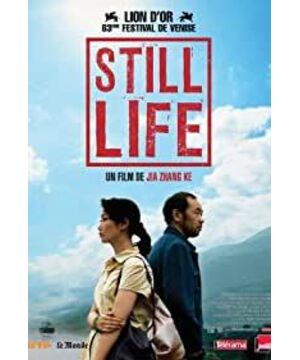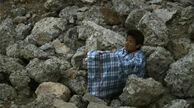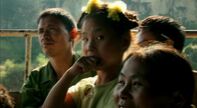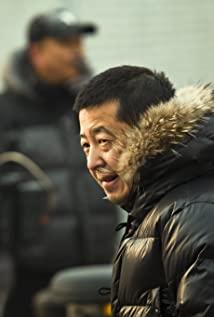Like the countless ceramic fragments we have found, they belong to different vessels from different historical periods, and they are mixed together and difficult to identify. But there is a vaguely related factor in it.
All we can do is "recover" a small part of it in our imagination. This unique "small part", together with the whole of those fragments that cannot be glued together, is where the full richness lies.
Perhaps the "history" that is full of logic and conforms to the regularity of linear time and history, as well as the "geography" that is full of political and power atmospheres, are nothing but scraps, or "imagination of scraps".
All "local chronicles", such as those implied in the "Three" film, and all "family histories", such as those presented in the "Man" film, are all imaginations of debris.
In the crumb pile, the author is making a meaningful game.
Zhao Tao's clue seems to present the Yangtze River dam under construction, and the opposite of "construction" is the disintegration of marriage and factories ("li");
the main point of Han Sanming's clue is to demolish the city of Fengjie, which is opposite to "demolition". It is the compounding of marriage.
Related to this, there are two scenes of mass entertainment: open-air song and dance performances watched by migrant workers, and scenes of open-air dances.
No doubt those crumbs occasionally have their own melody and counterpoint.
Like when the film is released: At the same time as "Golden Armor". By extension, this screening time did not constitute the situation of "The Good Man in the Three Gorges" vs "Golden Armor in the City" that some media hyped, but the tribute or joke of "Three" to Fager did indeed give birth to the movie. some kind of relationship. It is said that the Three Gorges is a rainy place. I haven't seen it myself, but I can smell the rain in the smoke/wine/tea/sugar: sticky, plain and everyday, and everywhere - the sound of thunder Hidden in the sound of hammers tearing down factories and houses. Dignified / restrained / restrained / cold humor, spreads and grows on the surface of secular life, but its roots are buried in hidden places that no one can see, and it always maintains a small distance from political discipline - I know it Jia Zhangke.
The part I am most interested in is the workers and peasants in the film. They are neither good nor bad, just never the same again. After ordinary farmers leave the land, there are two main ways out. One is to go underground and become coal miners; the other is to flood into cities and become migrant workers. I don't know if they were farmers or workers in terms of production methods. Han Sanming's constantly appearing back seems to indicate that farmers have started nomadic herding, they can go wherever they want and find opportunities to sell their labor at any time. After workers leave the factory, there are also two main ways out. One is to enter the company and assume new responsibilities and obligations; the other is to take to the streets and become individual traders. The moment Zhao Tao smashed open the iron cabinet with a hammer, I saw Yunwu tea, laborers' iron teacups, labor gloves, everything sealed in dust and rust, and deep mourning for a certain person's life as a worker.
A picture-scroll film cannot leave the poetry of panning. It is like the sudden look back of a standing watcher. Alienation and stillness, continuous space, and seamless time.
The moment Zhao Tao and the trade union chairman walked away together, the one-armed worker brother and sister were in the center of the camera. The worker's wife, after her husband was disabled, had no choice but to become a secret prostitute.
Perhaps, "The Three Gorges Good Man" can only be truly understood by putting it together with "Golden Armor". About the way out for Chinese movies, about all the noise and commotion, about all the scraps of 2006.
I keep recalling those empty mirrors in the factory space of "Three": the place where rusty water flows.
The rust of the whole - like a good man with golden armor.
View more about Still Life reviews









